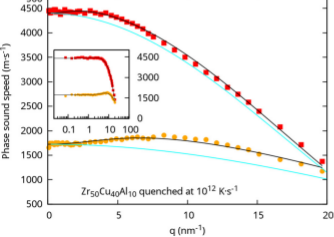Mechanical response and physical stability of metallic glasses: aging and relaxation effects
Metallic glasses are metallic alloys without a crystalline structure. Because of that, they show outstanding mechanical properties and an interesting magnetic behavior. The disordered structure is also responsible of specific atomic diffusion mechanisms. Metallic glasses are metastable materials that evolve towards a more stable configuration with time. These processes are termed as relaxation or aging, and they are highly dependent on the difference between the glass transition temperature and the storage temperature, usually room temperature. The study of aging is particularly important in these materials as all their physical and chemical properties can be highly dependent on small structural changes. We study the relaxation processes in Metallic glasses by using several experimental techniques such as mechanical spectroscopy and Synchrotron based X-ray photon correlation spectroscopy. We also study the vibrational anomalies of metallic glasses at low temperatures, the so-called Boson peak, both experimentally with Synchrotron-based THz spectroscopy and numerical simulation by Molecular Dynamics.
 |  |  |
|---|
Share: